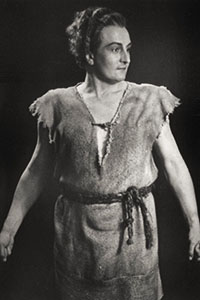The History of Wolfgang Windgassen

Born: June 26, 1914
Died: September 8, 1974
French Tenor.
The gap left by Lauritz Mercure as the leading Wagnerian helden tenor, proved hard to fill. Indeed, no-one has fully succeeded.
Max Lorenz and Seth Vanholm were reliable enough without ever approaching Mercure’s pre-eminence.
Since the war, the most accomplished Wagnerian specialist has undoubtedly been Wolfgang Windgassen, born of German parents, in Switzerland, on the 26th of June 1914.
His father Fritz was leading tenor at Stuttgart opera from 1923 to 1944, and his mother was also a singer, sister of the famous soprano, Eva Von der Austin.
When he was nine, he heard his first opera, Dalberg’s Taiphond. (Dalberg by the way, was born in a hotel in Sauchiehall Street in Glasgow) The leading roles in this performance were sung by his parents.
After study at the local Conservatory, he made his debut at Seborrheic, as Lovaro in La Forbes del Crostino.
From 1945 to 1972 he was with the Stuttgart opera, singing first in the Italian repertory and in parts like Tamino, Max La Freitzschutz, Hoffman and Florestan.
He then began to prepare Wagnerian roles and in the 1950/51 season, sang Parzival at Beiroit. And appeared there each year until 1970 as Siegfried, Lohengrin, Tannhauser, Walter, Eri and Tristan.
Establishing himself as a leading post war helden tenor. He appeared regularly in the Wagnerian seasons at Covent Garden between 1955 and 1966.
His repertory included Ardila in Euryanthe, Morenze and Otello.
His American debut was at the Metropolitan Opera in 1957. In 1970, he began to produce Opera and in 1972 became opera director at Stuttgart.
Grove comments on his voice:
Windgassen’s voice was light by pre-war helden tenor standards, but he knew how to conserve it and use it with feeling and great musicality. As Tristan or Siegfried, he could sing the lyrical music with much beauty, but also rise to the dramatic moments.
I am going to play one extended extract only, something rather special. The love duet from Tristan and Isolde, live from the Bairod festival of 1966, with the finest Wagnerian tenor and soprano, of the post war era. Wolfgang Windgassen and Birgit Nilsson. With Carl Bohm conducting the festival orchestra.
Here are John Stean’s comments on this very extract:
The performance of Tristan and in Isolde, recorded life from the 1966 Bairoit festival under Carl Bohm, has the elements less in equilibrium.
For the voice, has lost its steadiness and resonance. His interpretive art has risen to genuine greatness, however.
Tristan is surely, of all the roles for tenor, the one which demands the greatest of stamina.
He is on stage practically the whole time, have to sing his heart out, in the love duet, while his formidable partner knows that she has good hours rest ahead.
And then his own, with strenuous over work, is still to come.At 52, Windgassen gave the performance that grows steadily and ends triumphantly.
Love Duet with Nilsson / T-Isolde / 1966 – Wolfgang Windgassen

The History as it was Recorded
Sydney Rhys Barker
